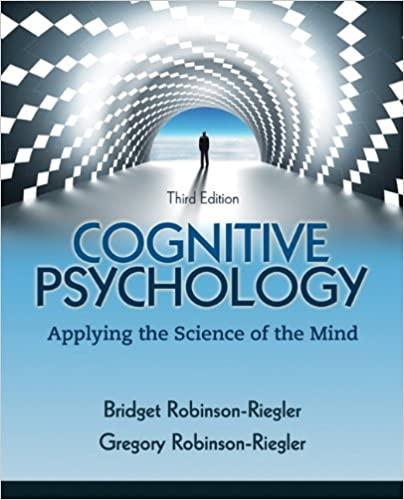Question
Using the Executive Functions, answer the below questions. cite work in 7th edition APA: a)Identify and explain any 2 of the three components of Executive
- Using the Executive Functions, answer the below questions. cite work in 7th edition APA:
a)Identify and explain any 2 of the three components of Executive Function.
b) Based on Spruijt et al.'s (2018) article, explain the role of sensitivity and scaffolding in supporting executive
functions in children.
c) What can parents do to support executive functions in children? Identify and explain 4 recommendations.
(Hint:consider concepts such as supportive presence and elaborative verbalizations)
Considering the typical brain-related changes that occur during adolescence, answer the following questions:
2. Identify and explain 4 major changes that occur in the adolescent brain.
3. Explain why most adolescents tend to engage in risk-taking and impulsive behaviors?
4. In most countries across the world, 18 years is generally considered as the legal age of maturity. Is this an appropriate cutoff? Explain your stand and support your arguments using developmental characteristics of the adolescent brain.
Applying the following theoretical perspectives on cognitive development, identify 3 practical strategies each that you would use in the classroom to support a child's cognitive development. For each example, specifically identify which concept from the theory you are applying in the strategy identified, and explain how that strategy/practice would support the child's cognitive development.
- Piaget's theory (give 3 examples identified and explained)
- Vygotsky's theory (give 3 examples identified and explained)
Applying your understanding of executive functions and their relevance to childcare practice, answer the following
questions:
5. Executive functions are considered as the air traffic control system of our brain. Explain this statement.
b) explain the "SOAR" strategies to support executive functioning in children recommended by
the Search Institute's Resource for Families (Meuwissen, 2015). Support each strategy with examples of how that can be used in the childcare/educational setting.
6. Making connections between the brain and language, answer both questions:
a) "Communication is a complex cognitive function." Explain this statement using concrete examples of 3 different
areas of the brain that contribute to language use. Explain the role of each of these 3 areas in language.
b) Briefly explain the bidirectional relationship between cognitive and language development.
Step by Step Solution
There are 3 Steps involved in it
Step: 1

Get Instant Access to Expert-Tailored Solutions
See step-by-step solutions with expert insights and AI powered tools for academic success
Step: 2

Step: 3

Ace Your Homework with AI
Get the answers you need in no time with our AI-driven, step-by-step assistance
Get Started


